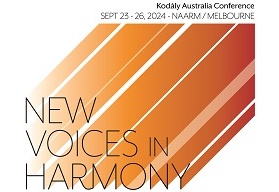The Kodály Concept
The Kodály (click here for the correct pronunciation) concept was inspired by the philosophies of the Hungarian composer and educator, Zoltan Kodály (1882 – 1967). Throughout Kodály’s writings are the notions that a person cannot be complete without music and that music serves to develop a person on all levels – emotionally, spiritually and intellectually.
Kodály believed that every person has musical aptitude and that, ideally, a music education should begin as early as possible in a person’s life – firstly at home and then later within the school curriculum.
Kodály believed that singing should be the foundation of all music education.
“It is a long accepted truth that singing provides the best start to music education; moreover, children should learn to read music before they are provided with any instrument…even the most talented artist can never overcome the disadvantages of an education without singing” (Kodaly, 1974).
The use of the voice is one of the most defining features of the Kodály approach. The voice is the most accessible of all instruments and this makes it most suitable for musical instruction and can lead to a highly developed musical ear. By focusing on learning through engaging with music, singing, playing, moving and enjoying, music becomes part of the natural learning process.
Developmental, Sequential, Cumulative and Continuous Music Education
Kodály believed that musical instruction should reflect the way that children learn naturally. Through singing games, fun and play the child discovers the musical elements as they are presented sequentially and has the opportunity to enter the world of music through the creative development of the ear and the eye.
The Kodály Concept within the Australian Context
Since its introduction into the Australian context the influence of the Kodály concept has been significant in the areas of early childhood, primary and secondary education. Research and training have underpinned endeavours in the ACT, NSW, Queensland, Victoria, South Australia and Western Australia and have encouraged many teachers to strive for a better musical future for their students.
Kodály, Z. (1974). The Selected Writings of Zoltán Kodály. London: Boosey & Hawkes.
The Kodály Concept
Latest News
Research Invitation: Teacher Growth and Development from Australian Kodály Certificate Courses
Kodály Australia is pleased to support the research project, Teacher Growth and Development from Australian Kodály Certificate Courses, conducted by Dr Jason Goopy (chief investigator) and Jason Boron at Edith Cowan University. This study aims to investigate teachers’ motivation to …
Read more
2024 Awards for Excellence in Kodály-Inspired Music Education
This is a reminder that nominations for the 2024 Awards for Excellence in Australian Kodály-inspired Music Education close this Sunday, 31 March 2024. I believe wholeheartedly that our members are the strength of our community. These awards provide a significant …
Read more
IKS Scholarship
The International Kodály Society (IKS) offers fee waiver scholarships to support participation in Kodály-inspired professional development. The closing date for the next round is 1 May 2024. Full information including selection criteria and eligibility is available on the IKS website. …
Read more
Membership Database Upgrade – Complete
Kodály Australia has now completed upgrading our membership database to our new GameDay service. All members will receive a reminder via email to renew their membership one month prior to their renewal date. Members can renew their membership online and …
Read more
Membership Database Upgrade
Over the coming week, the Kodály Australia membership database will be upgraded from our GameDay Classic system to the new GameDay service. This upgrade is necessary as GameDay Classic will shortly be decommissioned by our provider, StackSports. What does this mean for Kodály Australia members? Online …
Read more



